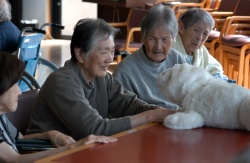Difference between revisions of "PARO Therapeutic Robot"
(→Disease) |
|||
| Line 19: | Line 19: | ||
== Positive Effects == | == Positive Effects == | ||
If PARO robots are used correctly and the human caretakers pay the same amount or more attention to their patients, these robots could make a positive difference. If someone with Alzheimer's Disease has a distraction, they are less likely to wander off or be aggressive. The robot can make the patient feel comforted and less anxious, improving their overall mood. | If PARO robots are used correctly and the human caretakers pay the same amount or more attention to their patients, these robots could make a positive difference. If someone with Alzheimer's Disease has a distraction, they are less likely to wander off or be aggressive. The robot can make the patient feel comforted and less anxious, improving their overall mood. | ||
| + | |||
| + | [[Category:2020New]] | ||
| + | [[Category:2020Object]] | ||
Revision as of 14:04, 17 March 2020
PARO is a therapeutic robotic baby harp seal intended to comfort people with emotional stress. This robot is most frequently used in nursing homes to comfort patients with dementia and Alzheimer's Disease and with children with autism. It is developed by AIST, a Japanese automation pioneer and has been used in Japan and throughout Europe since 2003. PARO contains sensors that allow for the robot to sense whether it is in a dark or light environment, and it can feel and reacts when it is being stroked, or beaten. In addition to these tactile and light sensors, the robot also contains an audio sensor to allow it to react to its name, praise, or hate that it receives from its owner. These sensors allow for the robot to act as though it is a real animal. This all sounds great in theory, but there has not been research done on how these robots actually affect the owners.
Contents
Nursing Homes
There are many problematic symptoms of Alzheimer's Disease. The PARO robots have been shown to reduce some of the problematic symptoms, such as agitation and wandering. However, having a robot instead of a human or therapeutic dog, for instance, has many downsides, as well. Many nursing homes try and focus on the relationship between the caregiver and the patient. This relationship can truly make a patient feel much more comfortable and overall happier. Having a robot comforting the patient instead of a human may decrease the positive relationship between the caregiver and the patient. Patients with Alzheimer's tend to fare better when they are able to form new bonds and relationships.Deception
Giving a robot to someone with Alzheimer's Disease or another form of dementia can deceive them into believing that what they have in front of them is a child or pet. People with Alzheimer's Disease sometimes have lucid moments, where their minds become relatively normal again and they realize the reality around them. If this were to happen when someone with Alzheimer's Disease was with their robot "pet," it could possibly make them afraid. Especially the Baby Boomers, the current elderly population, who did not grow up with technology. People are less likely to talk to the robot if they know it is not real, so the robot loses its purpose. So, if a patient becomes lucid for a few moments and realizes its beloved pet is actually a robot, it could cause extreme discomfort or emotional trauma.
Disease
One problem occurring with these PARO robots is cleanliness. Unlike therapy dogs, a PARO seal robot cannot be taken to the groomers and cleaned; nor can PARO robots be put through a washing machine. It is extremely difficult to keep one of these therapy robots clean. If the robots are being used to comfort many people, they are being passed around and obtaining many different germs. Most people in nursing homes have compromised immune systems, so sharing something with so many people is extremely unsanitary.
Human Interaction
When humans interact, our hormones also interact. Having a robot trying to bring out positive emotions in patients with Alzheimer's Disease can be much more difficult. For example, when humans interact, a hormone called oxytocin is released that frequently increases the trust between the two. It can take more time for the patient to bond to the robot than it takes for a patient to bond to their human caregiver. Having a robot be the main source of comfort to an Alzheimer's patient can also cause social isolation. In nursing homes, one of the main goals of the caretakers is to get the patients to interact with one another in order to form bonds and feel safe in their space. Giving these patients a robot instead of making them do exercises or play games with each other can be extremely bad for their mental health. Although PARO is not intended to replace social interaction, especially with patients with dementia, it seems as though it will. There is a concern that, because humans prefer for others to do the work that they are assigned, these robots will begin to make caretakers feel that they can put less effort into their job. The intention of these robots is to add another layer and better the care of these patients. If caregivers begin to slack due to these robots, the patients will get worse. For Alzheimer's patients, social interaction is very healthy. It can make the patients happier and even slow the rate of the neurodegeneration.Effects on Non-Users
These types of therapy robots affect more people than just those using them. Like all robots, these are beginning to take people's jobs. However, people are made to care for others, so robots cannot truly compare to human beings. Like mentioned above, there are many chemicals involved in human interaction that robots do not have. In addition to this, the moral repercussions of PARO have not been studied. If these robots are given to children with autism, or even anxiety, there is a chance that they could grow up with different values. Growing up seeing robots only taking care of people instead of other humans could cause children to have less empathy. Since these PARO robots are so new, the long term affects of them have not been studied, so no one can truly predict how they will affect people's moral character and values. However, the perceived effect is negative.
Policy
There are more therapy robots than just PARO. These robots are used worldwide to help patients of varying diseases. However, even though there are so many different types of therapy robots, there are no laws regarding them. There are no laws about the privacy of the users. In the past, there have been many apps for phones or gadgets that turn out to be made to spy on the users. No one has really looked into the safety of these PARO therapy robots in regards to the privacy of the users. Who knows what kind of information therapy robots could be collecting. Since these robots will continue to grow in popularity, it is likely that laws protecting people's privacy will be put in place.
Positive Effects
If PARO robots are used correctly and the human caretakers pay the same amount or more attention to their patients, these robots could make a positive difference. If someone with Alzheimer's Disease has a distraction, they are less likely to wander off or be aggressive. The robot can make the patient feel comforted and less anxious, improving their overall mood.

